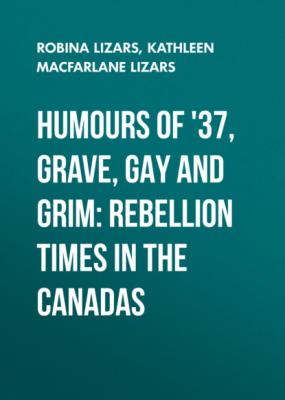Humours of '37, Grave, Gay and Grim: Rebellion Times in the Canadas. Robina Lizars
Читать онлайн.| Название | Humours of '37, Grave, Gay and Grim: Rebellion Times in the Canadas |
|---|---|
| Автор произведения | Robina Lizars |
| Жанр | Документальная литература |
| Серия | |
| Издательство | Документальная литература |
| Год выпуска | 0 |
| isbn | 4064066215569 |
Did to our eyes display.
There Conger with his company,
With Calcutt and with Clarke,
And Warren, with his rifle band,
Whom every eye did mark.
And on they went, a gallant set,
To stop the foes rebelling;
How many prisoners they took
Would take some time in telling.
Meanwhile Mackenzie, safe and sound,
Had got to Buffalo;
The Yankees sympathized with him
And made him quite a show.
Neutrality it was their law,
But that they never minded,
They sympathized with rebels so
It quite their reason blinded.
Their papers, too, were filled with stuff,
With nonsense and with lies:
So fast they told them, that you’d think
They lied but for some prize.
At length, when after much ado
They got two hundred men,
Mackenzie in high spunk set off
To try the job again.
At first I hear ’twas their intent
At Waterloo to land,
But Newcastle’s good rifles there
Were ready to their hand.
Rensselaer then took the command
Of those degraded wretches,
For some had neither coat nor hat,
And some not even breeches.
To Navy Island then they went,
And there made a great splutter—
A Constitution printed off,
And many threats did utter.
Alas, for Yankee modesty!
It really is quite shocking,
Some ladies made the rebels shirts, And some, too, sent them stocking.
Of many acts which by our men
Right gallantly were done,
I’ve spun my verse to such a length
I can relate but one.
And that the very gallant act
Of Captain Andrew Drew,
Whose name must be immortalized,
Likewise his daring crew.
A Yankee steamer oft had tried
The rebels aid to bring;
This English seaman swore that he
Would not allow the thing.
The Captain and his valiant crew,
Whose names I wot not all,
From Schlosser cut the steamboat out
And sent her o’er the Fall.
Oh! then the Yankees stormed outright,
And spoke of reparation;
A mighty flame then rose through this
Tobacco-chewing nation.
But little Mat was far too wise
The risk of war to run,
For he was one who never thought
In fighting there was fun.
So quickly to the frontier he
Sent General Winfield Scott,
Who in last war at Lundy’s Lane
A right good drubbing got.
Meanwhile upon the rebel host
Our guns so well did play
With shot and shell that they right soon
Were glad to run away.
And Duncombe, too, oh! where is he,
The Doctor, brave and bold?
Some say that he is dead and gone,
Being perished in the cold.
And now that the rebellion’s o’er
Let each true Briton sing,
Long live the Queen in health and peace,
And may each rebel swing.
And good Sir Francis Head, may he
With health and peace be crowned;
May earthly happiness to him
For evermore abound.
God prosper, too, my own loved land,
Thy sons so brave and true,
A heavy debt of loyalty
Doth England owe to you.
But as for those said Yankee chaps,
They well may pine and fret,
For, by lord Harry, they will have
To pay us all the debt.
And now to Mac. there’s still one step
To end his life of evil;
Soon may he take the last long leap
From gibbet to the——.
HUMOURS OF ’37.
Baneful Domination.
“Every reform was once a private opinion, and when it shall be a private opinion again it will solve the problem of the age.”
The vivacious Pompadour enlivens the twenty years of her boudoir conspiracies playing les graces with her lord’s colonies. She throws the ring; Pitt, at the other end of the game, catches Canada.
The mills of the gods in their slow grind have reversed the conditions of the contestants; the Norman conquest of England becomes a British conquest of New France. The descendants of the twenty thousand barbarians who landed at Hastings have but come to claim their own.
Life is “moving music.” The third movement in this historic sonata comes back to the original subject, even if the return to the tonic opens in a minor mode.
“Gentlemen, I commend to your keeping the honour of France,” says the dying Montcalm.
“Now, God be praised, I die in peace!” and Wolfe expires.
The fiercest of the conflict ever rages round a bit of bunting on the end of a stick. The lilies of France come down; up goes the Union Jack to usher in the birthday of the Greater Britain, and Horace Walpole says, “We are forced to ask every morning what victory there is, for fear of missing one.”
Voltaire gives a fête at Fernay to celebrate the deliverance from fifteen hundred leagues of frozen country; the Pompadour tells her Louis that now he may sleep in peace; and outsiders ask of Pitt that which a celebrated novelist, a century later, asks of his hero—“What will he do with
